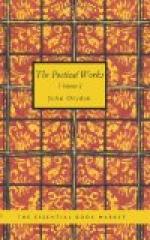me wholly to omit. I am sensible enough that
I had done more prudently to have followed his opinion:
but then I could not have satisfied myself that I
had done honestly not to have written what was my
own. It has always been my thought, that heathens
who never did, nor without miracle could, hear of the
name of Christ, were yet in a possibility of salvation.
Neither will it enter easily into my belief, that
before the coming of our Saviour the whole world,
excepting only the Jewish nation, should lie under
the inevitable necessity of everlasting punishment,
for want of that revelation, which was confined to
so small a spot of ground as that of Palestine.
Among the sons of Noah we read of one only who was
accursed; and if a blessing in the ripeness of time
was reserved for Japhet (of whose progeny we are),
it seems unaccountable to me, why so many generations
of the same offspring, as preceded our Saviour in
the flesh, should be all involved in one common condemnation,
and yet that their posterity should be entitled to
the hopes of salvation: as if a bill of exclusion
had passed only on the fathers, which debarred not
the sons from their succession: or that so many
ages had been delivered over to hell, and so many
reserved for heaven; and that the devil had the first
choice, and God the next. Truly I am apt to think,
that the revealed religion which was taught by Noah
to all his sons, might continue for some ages in the
whole posterity. That afterwards it was included
wholly in the family of Shem is manifest; but when
the progenies of Ham and Japhet swarmed into colonies,
and those colonies were subdivided into many others,
in process of time their descendants lost by little
and little the primitive and purer rites of divine
worship, retaining only the notion of one Deity; to
which succeeding generations added others: for
men took their degrees in those ages from conquerors
to gods. Revelation being thus eclipsed to almost
all mankind, the light of nature, as the next in dignity,
was substituted; and that is it which St Paul concludes
to be the rule of the heathens, and by which they are
hereafter to be judged. If my supposition be
true, then the consequence which I have assumed in
my poem may be also true; namely, that Deism, or the
principles of natural worship, are only the faint remnants
or dying flames of revealed religion in the posterity
of Noah: and that our modern philosophers—nay,
and some of our philosophising divines—have
too much exalted the faculties of our souls, when they
have maintained that by their force mankind has been
able to find out that there is one supreme agent or
intellectual Being which we call God: that praise
and prayer are his due worship; and the rest of those
deducements, which I am confident are the remote effects
of revelation, and unattainable by our discourse,
I mean as simply considered, and without the benefit
of divine illumination. So that we have not lifted
up ourselves to God, by the weak pinions of our reason,




